Another Wave Of Covid-19 Will Hit Iran In Weeks As Omicron Cases Surge
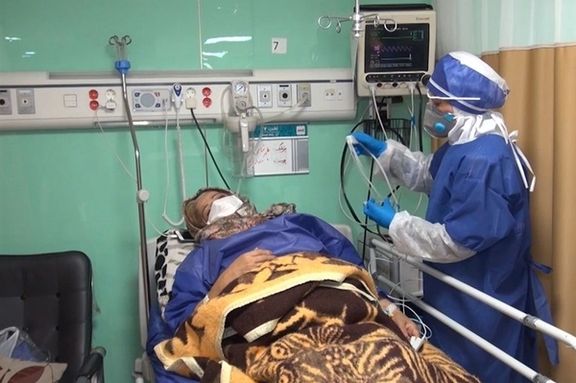
The coronavirus Omicron variant is fast spreading across Iran, with reports of Covid patient numbers rising from two to five times in some cities.

The coronavirus Omicron variant is fast spreading across Iran, with reports of Covid patient numbers rising from two to five times in some cities.
A health official in the city of Ahvaz said on Wednesday that the number of patients in the east of the city has risen five times compared with previous week and another report put the country’s average increase at 175 percent in the past three days.
Health ministry officials in provinces of Esfahan and Kerman also reported sharp rises in the number of cases, while an official from Qom province said that the number of Covid-19 patients is increasing exponentially because over 30 percent of the people in the province have not even received their first vaccine shot.
As the number of hospitalizations has jumped by 77 percent throughout the country, an official from Iran’s Covid-19 taskforce, Hamidreza Jama’ati, said the next peak will hit in the next few weeks, adding that omicron is set to become the dominant type of coronavirus in Iran.
Last week, the World Bank confirmed a $90-million loan for measures to fight the Covid-19 pandemic in Iran, saying it is "the epicenter of Covid-19 infections in the region".
Iran, which confirmed the first Omicron case on December 19, is the worst hit country in the Middle East by at least 132,000 deaths since February 2020.
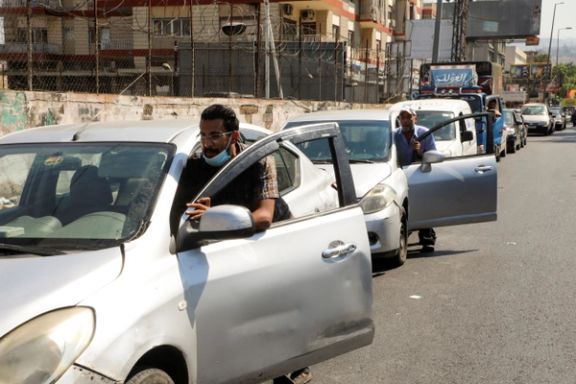
France's foreign minister said on Tuesday the United Arab Emirates would join a Saudi-French fund that aimed to provide support to the Lebanese people.
Riyadh and Paris agreed in early December to establish a common humanitarian mechanism to alleviate the suffering of the Lebanese as a first step to Saudi Arabia re-engaging with Lebanon after a diplomatic row between Beirut and the Gulf states.
"The visit by President (Emmanuel) Macron enabled the Gulf (Arab countries) to renew ties, which saw (the creation of) a joint Franco-Saudi fund to support the Lebanese, which will be helped tomorrow or the day after with a contribution from the United Arab Emirates," Jean-Yves Le Drian told a parliamentary hearing.
Le Drian gave no details on how the fund would work or how much was being pledged.
France has led international efforts to resolve the political and economic crisis in Lebanon.
But despite staking a lot of political capital on the issue for more than a year, President Emmanuel Macron has failed so far to push the country's squabbling politicians to carry out economic reforms that would unlock vital foreign aid.
Le Drian condemned efforts led by Iran-backed Hezbollah to prevent cabinet meetings and remove political blockages surrounding an investigation into the 2020 Beirut port explosion, saying this was an "unacceptable obstruction" for political objectives.
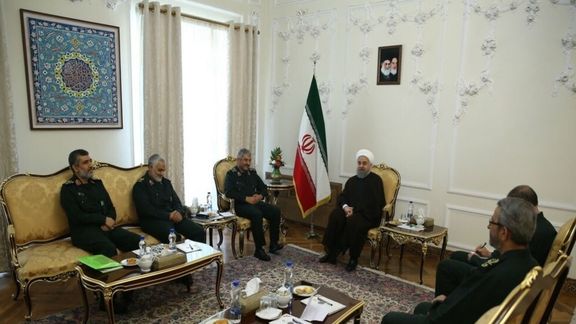
An IRGC commander has disclosed details of a "very frank and fierce meeting" with former President Hasan Rouhani in which commanders, including Ghasem Soleimani, issued a stark warning to him.
The interview with the IRGC Aerospace commander Amir-Ali Hajizadeh was published by the hardline Kayhan newspaper Wednesday and was focused on Soleimani, the slain commander of the IRGC Qods Force, who was killed in Baghdad by a US drone strike on January 3, 2020.
Hajizadeh told Kayhan that the meeting with the former president was held during his second term of presidency to warn him that the IRGC would not stay silent regarding his “transgressions.”
Hajizadeh was probably referring to Rouhani's meeting including Commander-in-Chief Mohammad-Ali Jafari and Soleimani on July 25, 2017, a few days before the confirmation of Rouhani’s re-election by Supreme Leader Ali Khamenei. Hajizadeh's account of the meeting is in stark contradiction to state media reports at the time which said Rouhani and the commanders had expressed support for each other without mention of any confrontation.
Summer of discontent
Tensions between Rouhani and the IRGC rose to new heights after his re-election on May 29, 2017. In a June 23 meeting with businessmen, Rouhani strongly criticized IRGC's business activities. "Part of the economy is controlled by an unarmed government, but we surrendered it to a government armed with guns," he said about IRGC's meddling in government affairs.
Rouhani was apparently referring to IRGC-affiliated business consortiums' taking over big companies such as the Iran Telecommunications Company in 2009 in the name of privatization during the presidency of Mahmoud Ahmadinejad. The Mobin Trust Consortium, largely owned by the IRGC Co-op Foundation, had won the tender for $7.8 billion along with two other state entities under irregular and suspicious circumstances.
In the interview with Kayhan, Hajizadeh did not make any mention of IRGC's economic activities and said the commanders offered to help Rouhani's government. "You saw in crises such as floods and earthquakes and other things the IRGC was really present," he said in the interview while accusing Rouhani of "assaulting friendly forces," meaning regime insiders.
"The Revolution, people, the ruling system, and the Leader are our redlines. Don't think you can always say these things and we will remain silent," Hajizadeh said the commanders in the meeting warned Rouhani while adding that Soleimani expressly warned Rouhani not to follow the same path as Ahmadinejad.
"Do you want to become like him? Why are you self-harming? Why are you constantly attacking us? Let's solve the problems," Soleimani told Rouhani according to Hajizadeh.
Do you want to become like Ahmadinejad?
Many allege that it was the IRGC that helped Ahmadinejad, a quite obscure figure, to climb the political ladder and capture presidency in 2005.
Relations between Ahmadinejad and the IRGC deteriorated during his second term, after he was once again helped by the Guards to overcome rivals in the disputed elections of 2009. But in 2011, Ahmadinejad publicly defied Supreme Leader Ali Khameneiover sacking his intelligence minister Heydar Moslehi. He also attacked the Guards publicly on several occasions and even dubbed them "our smuggler brothers" in reference to IRGC's massive role in hugely profitable illicit imports through ports under its direct control.
Apparently referring to Ahmadinejad and Rouhani's objection to IRGC's support of proxy forces in regional countries, Hajizadeh said under the influence of "poisonous propaganda" many questioned Soleimani's spending of Iranian money in other countries. "Why does he take our money abroad? Why, in their view, does he support a dictator? Why should we get involved in Syria anyway?" Hajizadeh said, presumably referring to Ahmadinejad and Rouhani.
In the interview, Hajizadeh also admitted that there was so much opposition to the IRGC's involvement in Iraq and Syria that the death of its forces in the early days of the conflicts had to be kept secret. "We really didn't know how to justify the deaths of the first martyrs of the wars in Iraq and Syria," he said adding that not being able to call them martyrs and burying them as such was a big problem and they had to be buried without any ceremonies.
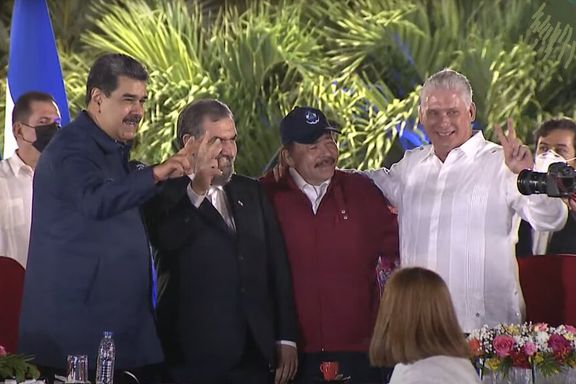
Argentina is outraged over the presence of a top Iranian official implicated in a 1994 terrorist attack in Buenos Aires, in the inauguration of the new Nicaraguan president.
Argentina’s Foreign Ministry said on Tuesday that the presence of former IRGC commander Mohsen Rezaei, who is currently Iran’s vice president for economic affairs, at the inauguration of Daniel Ortega is an insult to the victims of the bombing of the Jewish center in Buenos Aires.
The ministry called it “an affront to Argentine justice and to the victims of the brutal terrorist attack″ in the Argentine capital that killed 85 people in 1994.
The Argentinian government itself is under criticism by people and the opposition for allowing its ambassador to attend the investiture of a president who won his fourth consecutive term in a purportedly rigged election and is accused of gross human rights violations, and for being at the same event with Rezaei.
Fulvio Pompeo, a senior official of the opposition party PRO, said that the government was not only ″being partners with dictators and human rights violators in our region″ but also acting as ″accomplice″ to an organizer of the terrorist attack.
Rezaei, along with several other Iranian officials, is wanted by Argentina on an Interpol “Red Notice” because of the bombing of the Jewish center, which was carried out in cooperation with Hezbollah.
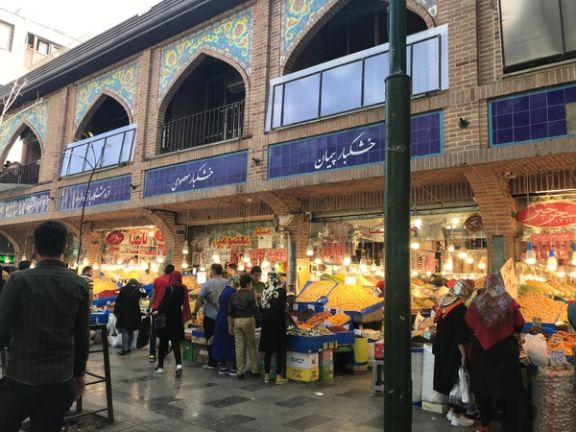
A new report about the Iran's economic growth prospects for the current fiscal year, forecasts a 6.2% “real” GDP growth in the most optimistic, and 3.4% growth in a pessimistic scenario.
The report is produced by the Iranian Parliament Research Center, which is not one of the official economic reporting organs of the state.
The International Monetary Fund (IMF) has estimated about 2.5% real GDP growth for 2021 and 3.4% growth for 2020, after a 12.8% cumulative economic contraction during 2018 and 2019.
Iran will need years of much faster growth just to return to the point where it was in 2017.
These figures represent the total value in 2010 “constant prices” of final goods and services produced within a year, disregarding current inflationary prices and the fall in the value of the national currency.
Regarding the increase in both oil production and exports in the current Iranian year, the real GDP growth is reasonable, but not to the level that could compensates the 12.8% economic contraction in 2018 and 2019.
The data intelligence company, Kpler, has estimated Iran’s crude oil and gas condensate exports to have reached 620,000 barrels per day in 2021, which indicates almost 100% growth year-on-year. The figure was 2.5 mb/d during pre-sanctions era.
OPEC also estimated that Iran’s crude oil production has increased to 2.4 mb/d in 2021, about 400,000 b/d more than in 2020. The figure was 3.8 mb/d during the pre-sanctions era.
Iranian Parliament’s Research Center says the oil sector has experienced 9.9% growth in the first half of current fiscal year and may continue in this pace and possibly climb 18% for the whole year, in an optimistic scenario.
The real face of the economy
The “real” GDP growth is a method to compare GDP in a specific period with a corresponding period in the past, without measuring inflation and fluctuations in the value of a country’s currency.
But, the average annual inflation rate in Iran during 2018-2021 was about 35%. On the other hand, Iran’s national currency has lost most of its value, plunging from below 50,000 rials/1 US dollar to 250,000 rials/1 USD during this period.
Both IMF and the World Bank updated their estimations in late 2021 about Iran’s nominal GDP, based on the “current prices” (with measuring inflation).
IMF’s calculation says Iran’s nominal GDP, based on the low “official” USD rate (42,000) has almost doubled since 2017 and reached about $835 billion in 2020, but the World Bank says it declined from $445 billion in 2017 to $203 billion in 2020, based on the USD rate at Iran’s open currency market.
Considering the fivefold difference between official and open market currency rates in Iran, the huge gap between the two estimates is quite reasonable.
Iran’s government plans to eliminate the low “official” dollar rate that the IMF has used. This rate was applicable only to controlled imports of essential goods, such as food and medicine. It is not clear why IMF made its calculations based on this rate. Therefore, it is expected that the IMF will adjust its calculation and put the country’s nominal GDP at a level, close to World Bank’s estimated figure.
In this case, Iran’s nominal GDP with 83 million population, equals half of United Arab Emirates’ and one-third of Saudi Arabia’s or Turkey’s GDPs.
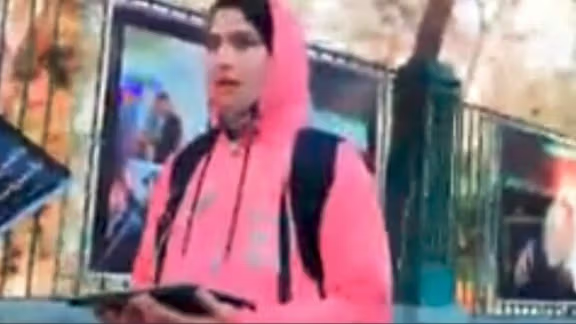
A student interviewed by Iran’s state-run TV on the downing of an airliner in 2020 says her words were doctored to support the official account of the incident.
The video report in which university student Shaghayegh Amiri appeared was shown by the state-run television (IRIB) on the anniversary of the downing of a Ukrainian airliner on January 8, 2020, by the Revolutionary Guards (IRGC). Speaking to local media Tuesday, she said the airing of the vox-pop has caused her great pain because what she appeared to be suggesting in the report was not what she had actually said.
The report consisted of a succession of fast-paced sentences chosen from interviews with young people in Tehran streets. The answers were arranged in a way as to suggest that they all agreed that the decision by the missile operator to shoot down the plane was logical.
The IRGC, which after three days of denial finally admitted that it had downed flight PS752 with two missiles, maintains that the operator of the air defense system mistook the plane for an enemy missile and made a hasty decision to shoot it down to save lives.
Many Iranians, including most of the victims' families, believe that the IRGC intentionally shot down the plane. Such suspicions are reinforced by the fact that the tragedy occurred only hours after the Guards fired more than a dozen missiles at bases hosting American troops in Iraq in retaliation for the US targeted killing of Qods Force Commander Ghasem Soleimani just days earlier.
The young student said many among her family and friends who are not aware of the circumstances in which the interview took place are upset with her that she made remarks contradicting her own beliefs.
In her own defense, Amiri claimed that the interviewers used various tricks to manipulate her and her companion to say what they wanted to hear from them to suit their scripted scenario and heavily edited the footage they had taken to remove what did not fit the script.
According to Amiri, the IRIB reporters approached her as she was waiting for a friend on the street and told her they wanted to ask some questions for a program on the occasion of the second anniversary of the tragedy that killed all 176 onboard the commercial flight.
"They gave me a tablet and asked me to play a video. In it you saw a red spot on a radar screen which indicated danger and you had to decide whether to shoot at it or not … 200 people would be killed if you shot at it and if you didn't, 5,000 lives would be lost. You had to decide [fast] which was more logical, the killing of 200 or the death of 5,000," Amiri said about the circumstances in which the interview took place. She accused the interviewers of insisting that she say she would fire at the plane if she were in a position to have to make a decision.
Amiri said that she challenged the interviewers and pointed out that the first missile shot at the Ukrainian plane may have been fired by mistake, but a second missile was also fired. "I asked them what justified the firing of the second missile. But none of this was included in the video shown on television," she said.